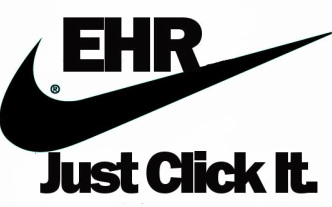
Ever feel like the government is one big bully, forcing you to click a box or else? If so, you aren’t alone. At a recent conference presentation I attended on EHR use, the presenter* revealed that a good portion of the providers at his practice feel bullied into using an EHR. Their comments included
Many of our Quillen ETSU providers have made similar comments, and who can blame them? Change is never easy, and when that change is implemented with the consequence of “or else,” it’s no wonder that many providers feel bullied into using an EHR.
But what strategies do we encourage our children to use when faced with a bully? The most common strategy, but one that’s effectiveness has recently been questioned, is to “walk away.” And questioned rightfully so. A child who walks away from a bully doesn’t make the bully go away. And doctors who walk away—well, they’d just need to find another job, right? —because the EHR isn’t going away.
So what bully strategies do work? Most experts encourage children to get involved with a another group. With positive peers around, the bully finds it harder to isolate the victim, and, often, the group’s positive influence becomes contagious, even to the point of affecting the bully.
To apply this same strategy to our EHR scenario works as well. Rather than providers giving up, walking away, and joining the unemployment line, working with the EHR can have some positive outcomes on our patient population. With the entire staff on board, and negative attitudes put aside, consider the benefits of using the EHR:
Although this is a short list, there are many more benefits that can be added to it. So for those users who have taken the attitude “If you can’t beat it, join it” or better yet, “I love it,” pass along your sentiments.
And for those “victims” out there, adopt a new strategy and let some positive peer pressure affect you.
*Presentation by Scott Tuning, Clinical Information Systems Manager, New Mexico Heart Institute, Albuquerque, NM
- “I don’t really care what the government wants me to do.”
- “I want to tell my story in my own way, in my own words.”
- “An EMR can never tell me how to practice medicine!”
- “I don’t really care what’s in the note so long as you leave my narrative alone.”
- “I’m not going to use it.”
Many of our Quillen ETSU providers have made similar comments, and who can blame them? Change is never easy, and when that change is implemented with the consequence of “or else,” it’s no wonder that many providers feel bullied into using an EHR.
But what strategies do we encourage our children to use when faced with a bully? The most common strategy, but one that’s effectiveness has recently been questioned, is to “walk away.” And questioned rightfully so. A child who walks away from a bully doesn’t make the bully go away. And doctors who walk away—well, they’d just need to find another job, right? —because the EHR isn’t going away.
So what bully strategies do work? Most experts encourage children to get involved with a another group. With positive peers around, the bully finds it harder to isolate the victim, and, often, the group’s positive influence becomes contagious, even to the point of affecting the bully.
To apply this same strategy to our EHR scenario works as well. Rather than providers giving up, walking away, and joining the unemployment line, working with the EHR can have some positive outcomes on our patient population. With the entire staff on board, and negative attitudes put aside, consider the benefits of using the EHR:
- Patient lists can be generated for better tracking of patient populations, for instance, identifying cardiology patients with low ejection fractions but no ICD.
- Candidates for clinical research trials can be quickly identified.
- The accuracy of medication lists is improved.
- Order tracking is improved and the cost savings from duplicate orders are passed along to the patient.
Although this is a short list, there are many more benefits that can be added to it. So for those users who have taken the attitude “If you can’t beat it, join it” or better yet, “I love it,” pass along your sentiments.
And for those “victims” out there, adopt a new strategy and let some positive peer pressure affect you.
*Presentation by Scott Tuning, Clinical Information Systems Manager, New Mexico Heart Institute, Albuquerque, NM
 RSS Feed
RSS Feed